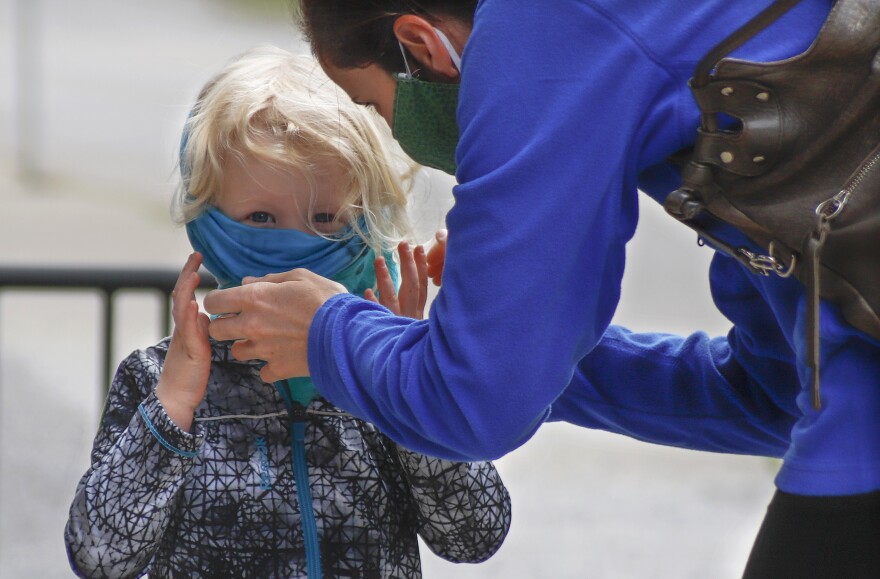A group of western Pennsylvania parents is suing members of the Wolf administration and UPMC. The parents argue that the denial of exemptions to the state’s COVID-19 school mask mandate violates their kids’ constitutional rights and federal disability law.
The suit was filed last week in U.S. District Court, and involves more than a dozen children, from ages 6 to 17, in nine different school districts. It claims the students have medical conditions and disabilities that make them unable to wear masks, and in some cases face shields.
Several of the children purportedly have attention-deficit hyperactivity disorder, or ADHD. Of the two students who have autism, one also has cerebral palsy. Other diagnoses include adjustment disorder, depression and obsessive-compulsive disorder.
The complaint says all the children either have anxiety disorders or experience anxiety due to masks. This includes one 8-year-old whose mother said the girl has “headaches” and “malaise” when she wears the face covering.
When asked about the lawsuit, both the Pennsylvania Department of Education and Department of Health said they do not comment on pending litigation. But the health department noted that “individual school districts are responsible for enforcing the order and ensuring individual exception requests are appropriate.”
It’s true this power rests with districts. But while Mark DiRocco, head of the Pennsylvania Association of School Administrators, agrees there's "likely some variation" in how districts evaluation exemption requests, "we think the [state] guidance is pretty clear."
That's because the department of health recommends that districts "follow established processes" through what's known as a "504 plan." The 504 process was created by the federal Rehabilitation Act of 1973, which allows for accommodations based on a student’s disability. For example, a 504 plan for a child with ADHD may allow for additional time to finish a test.
It appears from the complaint that while some districts do require families to apply for or amend an existing 504 plan, others only ask for medical proof.
However, neither a verified medical condition or disability nor the existence of a 504 plan requires a district to automatically grant a request for accommodation. Instead, there’s often a back-and-forth in order to find a reasonable solution.
“That interaction is missing in the complaint,” said Jasmine Harris, who specializes in disability and anti-discrimination law at the University of Pennsylvania’s Carey Law School.
While the parents say their children’s constitutional rights are being violated, Harris noted the same can be said of kids who are subjected to unmasked peers — especially if a student has certain health conditions such as asthma.
“Prior to the mask order, we were hearing multiple times a day from families [whose] children weren’t going to be able to attend school,” said Margie Wakelin of the Education Law Center, which has offices in Pittsburgh and Philadelphia.
Wakelin sympathizes with the parents' concerns and said the stories in the complaint were “troubling.” But she believes there are likely administrative solutions to address the “limited cases” where schools deny a proper mask exemption. She said that in her experience, districts are making accommodations.
Many of the kids needing mask exemptions are those with autism, remarked Wakelin. People with this diagnosis may have sensory issues that make wearing a face-covering extremely uncomfortable. Wakelin cited one case where a child’s special-education team developed a plan that helped them acclimate to wearing a mask over time, but did not require it immediately.
Wakelin remarked that the state’s mandate “does not require specific medical documentation as long as the need for the mask exception has been established based on a child’s preexisting medical condition or disability.”
If this is the case, a child may already have a 504 plan or an individualized education plan, which is a program for a student with an identified disability that ensures they receive specialized instruction and accommodations. The Education Law Center encourages families who may need an exemption to utilize these plans in their requests.
That approach apparently worked for one family in the complaint. Even though her pediatrician's office said it was not issuing mask exemptions, the mother of the child with cerebral palsy and autism worked with a 504 coordinator to get an exception.
There’s an administrative appeals process for parents who are unsatisfied with the accommodations that a school offers. But Wakelin said the lawsuit doesn't make clear whether “that process had been engaged fully” by parents or districts.
For example, the plaintiffs include a mother of two in Armstrong County who was told she needed 504 plans for her kids. The mother said she did not want to do so, but still submitted medical documentation in an attempt to obtain exemptions.
In some cases, parents say they tried to get documentation for a 504, but were told by medical offices that they had blanket policies against granting mask exemptions. Several of these providers are employed by UPMC, which is why the health care system is named in the lawsuit.
“UPMC is the 800-pound gorilla in western Pennsylvania,” said the plaintiff’s attorney Alexander Lindsay. “The Department of Health can write there’s an exemption, but the reality is there is no such thing because doctors will not write them.”
Lindsay contends that if the state continues to enforce the mask mandate, then it needs to create a clearer regulatory process for exemptions, which medical providers must be willing to participate in.
When contacted by WESA a UPMC spokeswoman said, “We won’t have a comment for this story.”
Though the process for Pennsylvania students getting mask exemptions might need to be refined, both Wakelin and Harris are adamant the mandate itself must remain in order to protect a large number of students with disabilities and complex health needs.
“One’s constitutional rights [extend] just as far as they touch someone else’s. They are not absolute,” said Harris. “And the Constitution does not guarantee a right to education.”





